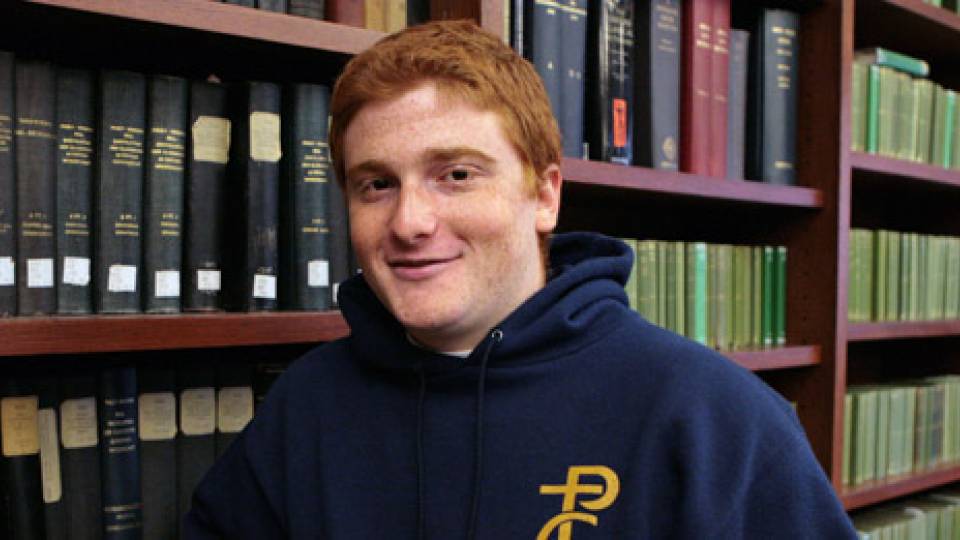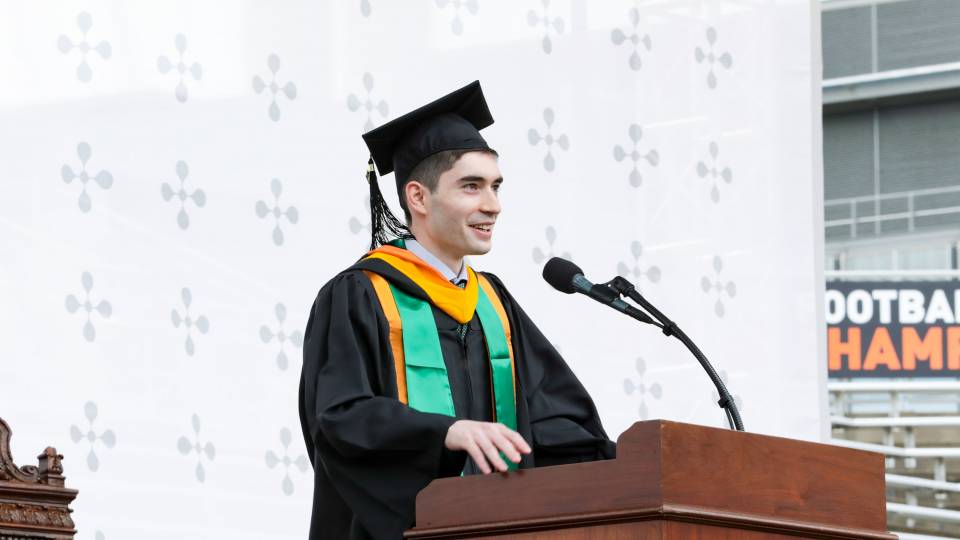Delivered by Zachary Squire
Commencement
June 3, 2008
Princeton University Class of 2008
I'd like to start by congratulating the great class of 2008. We've finally made it. After tests, quizzes, exams and midterms, papers, problem sets and programs, task forces, theses and core labs, we have come to Commencement: Today, we graduate.
But the word "commencement" signifies not an end, but rather a beginning. Today, we look to the future. The period of probation is over. The testing and instruction which are meant to have prepared us for our adult lives have been completed, and we are now standing face to face with the prospect of life after Princeton.
For many of us, of course, this life will differ little from what we knew as undergraduates. A career in academia awaits a good number of Princetonians, who will undoubtedly prove to be the intellectual leaders in their fields and some of the most important scholars of our generation. But for most of us, I am sure -- and I am included in this number -- the most formal part our academic training is more or less complete. We will be claimed by law, medicine or one of the myriad facets of business, and go on to new experiences of learning.
Princeton is of course the finest undergraduate academic institution in the nation, if not the world -- but it is so much more. Princeton is not just where we came to get an education. Here is where we lived, for four of our most formative years. Here is where we learned who we are. On this day, we are all faced with the immediate question of how we will live our lives. Despite the great wisdom and learning of the Princeton faculty, I doubt that many of us found the answer in the classroom. For me, it was learned from my friends and my peers -- from the example of you all, who are most responsible for teaching me what I have learned at Princeton. Today, I happen to be standing on the dais; but it is you, the Princetonians of the great class of 2008, who deserve applause and congratulation.
There is a short poem by Archilochus which, like many things in ancient Greek, sounds a lot more intelligent before it is translated into English. Archilochus wrote, "The fox knows many tricks, the hedgehog one good one." When I think about this poem in the context of Princeton, I imagine a hedgehog all burrowed down in a burrow of books; a Princetonian who knows one thing and knows it well. Is that what we should aspire to be? The distinction to be earned in scholarship is certainly important, and it would be appropriate for me above all people to extol the virtues of dedicated and constant study. But intelligence is a small aspect of one's character, and one in my view less important than qualities like humility, generosity, good humor and loyalty to one's friends. It is in activities which have expressed these virtues that many of us have thrived most importantly in our time here. Academic achievement certainly brings distinction to oneself. But what I am most proud of in my time at Princeton was my work for the student government; though I held a relatively minor position, I believe my work for the Undergraduate Life Committee did more to help my classmates than anything else I did.
As Princetonians, we are fortunate to have the message of Archilochus' poem instantiated for us in a sculpture by Richard Serra just across Washington Road. The sculpture is called "The Hedgehog and the Fox," and it consists of three enormous curving sheets of iron which are laid upright next to one another to form two paths between them. The corridors formed by the sheets of iron are twisting ones, but in the end each one allows you to take only one path, forward or back. If you concentrate solely on moving through the sculpture, there is really only one thing for you to do, one way for you to move. But the sculpture itself is not these walkways; rather, it is the fabric of the iron which shapes and surrounds them. Serra has left the iron untreated and unfinished, allowing it to show all the roughness and scratches that went into its formation and all the rust that has accrued on it throughout its life. It is this raw, untreated surface which surrounds us as we move through the sculpture and shapes the very pathway we take through it. It is by pausing to immerse ourselves in these surroundings, to absorb the sometimes coarse and unfinished details of our novel environment, that we fully engage our senses and become aware of our relationship to the world. If we concentrate solely on making progress along our path, we miss the big picture entirely.
An undergraduate career at Princeton, it seems to me, is a similar experience. We have all come to the end of a winding path of academic progress, and this is, in itself, certainly a great accomplishment. But the fabric of life which surrounded us along our path perhaps imparted us with more opportunity for reflection and growth. In comparison with the list of academic accomplishments I rattled off earlier, how much more will the hard work that went into things like athletics -- the close wins, the tough losses, the bonfire for beating Yale -- how much more will performances, recitals, arch sings and debates be remembered? When the black and orange horde of alumni descends upon the Princeton campus every year for the great ritual of Reunions, it is not their time in class that they have come to celebrate and briefly relive. It is the time spent with friends and comrades that, for most of us, defines what it meant to be at Princeton.
So, on this day it is certainly appropriate to tip our hats to the amazing faculty of Princeton, and I would most of all like to thank all the teachers and professors who have made my academic experience here so rewarding. All of us have now received an intellectual education of the most expansive scope and the deepest rigor. It is our professors who have taught us how to think. But it is our classmates who have shown us who we are. And so I would like to take this opportunity for speaking in public to offer you all the highest praise, the warmest congratulation and the deepest thanks. It is you, the great class of 2008, who have given me what is most memorable and valuable that I will take away from Princeton, and I wish you all the best of luck and the greatest success as you pass through FitzRandolph Gate.

